Aristotle Biography 5: the Academy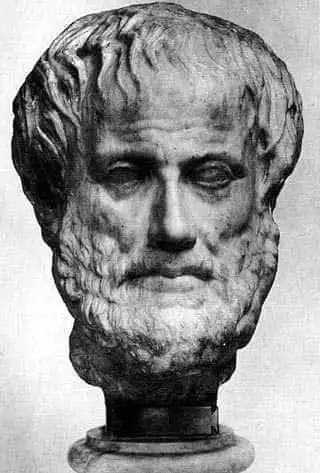 The life and time of the Greek PhilosopherThe Academy
Plato's Academy was founded in 388 or 387 BC, in a public garden for gymnastic purposes, donated to Athens by Academus (or Hecademus) thereof its name. It was in the outskirt, about six stadia, a little more than one kilometer, from the city. A wall was built around it, and the area contained statues, temples and sepulchres of noted Athenians. Plato was himself to be buried there. There were also plane and olive trees. The latter were said to stem from the sacred olive tree in the Erechtheum, and the oil from them was given as prize to winners in the Panathenian festival.
Within this enclosed park, Plato had inherited from his father a small garden and that was where he opened his school. It was to last more than 900 years, until 529 AD, when Emperor Justinian deemed it pagan and had it closed. Over the door to it was written: "Let no one unversed in geometry enter here." True, the most important work in mathematics of the 4th century, was made by people around Plato. His ideas of the course of study were to start with arithmetic, geometry, astronomy and the like, for ten years, as a basic training of the mind. Then five years of 'dialectic', which was the art of conversation, of pursuing lines of questions and answers, which was a training to be able to reach the essence of things at length in search of a first principle.
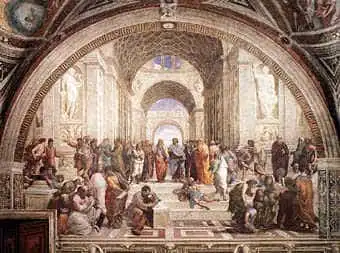 School of Athens, by Raphael.
PupilsWhen we picture the Academy, our eyes automatically see the same as Raphael did in his painting of it from around 1510, more than 1800 years later: Plato and Aristotle in the center, discussing matters of philosophical grandeur, and other people in the picture are little more than scenography. How could we see it in any other way, given the immense importance of the two giants in the history of thought? But at the time when they actually walked there, in the pleasant garden with statues and olive trees, it was quite different. Plato was at the center, certainly, but around him was a group of learned pupils, some of them having studied for Plato longer than Aristotle had lived.
From the close circle of Plato's most devoted pupils, he demanded no fee. Among them were: Speusippus, Xenocrates of Chalcedon, Heraclides of Pontus, Hestiaeus of Perinthus, and Philippus the Opuntian. Others, who were not regularly enrolled among his immediate followers, included Iphicrates, Timotheus, Phocion, Lycurgus, Hyperides, Isocrates, and possibly Demosthenes. Also Hermias, the former slave, who might have become a close friend to young Aristotle, and was the recipient of Plato's sixth letter, which mentions pupils Erastos and Koriskos, but none else. Another was Eudoxus of Cnidus, who led the school when Plato was in Syracuse.
Known pupils at the Academy, according to Diogenes:Speusippus (c.407-339 BC)Xenocrates of Chalcedon (396-314 BC) Aristotle (384-322 BC) Philippus of Opus (fl. 4th century BC) Hestiaeus of Perinthus Dion of Syracuse (409-354) Amyclus of Heraclea Erastus of Scepsus Coriscus of Scepsus Timolaus of Cyzicus Euaeon of Lampsacus Python Heraclides of Aeneus Hippothales of Athens Callippus of Athens (maybe C. of Cyzicus, c370-c310 BC, who had been a student of Eudoxus and started working with Aristotle at about 330) Demetrius of Amphipolis Heraclides of Pontus (387-312 BC) Lastheneia/Lasthenia of Mantinea Axiothea of Phlius Diogenes maybes:Theophrastus (c.370-286)Hyperides the orator (390-322 BC) Lycurgus Demosthenes (384-322 BC, same birth and death year as Aristotle) In other sources:Iphicrates (the general, 415-353 BC)Timotheus (the general, 354 BC) Phocion (the general, 402-318 BC) Isocrates (the orator, and competitor, 436-338 BC) Hermias of Atarneus (-341/340 BC) Eudoxus of Cnidus (408-355 BC) Menedemus of Pyrrha SpeusippusSpeusippus (c.407-339 BC) was clearly the most influential of the Academy members, except for Plato, serving as a right hand of his. When Plato opened his school, Speusippus was about 19 years old, and well acquainted with him through family relations, being the son of Plato's sister Potone. His father's name was Eurymedon, belonging to the deme of Myrrhinus. Speusippus was, like his teacher, involved in the politics of Syracuse, and when Plato died, he became the head of the Academy for no more than eight years, until his death.Diogenes Laertius states that Speusippus remained faithful to Plato's teaching, but differed from him in character, being "prone to anger and easily overcome by pleasures." Diogenes quotes a letter from Dionysius, complaining that where Plato rejected fees from his close pupils, Speusippus eagerly demanded them, with no exception. This letter, though, is regarded as forgery. Toward the end of his life, he was crippled by bad health, and may therefore have committed suicide. Diogenes claims that he wrote a number of memoirs and dialogues, listing 30 by title, and counting a total of 43,475 lines. Two of those texts are on Aristippus, one on wealth and one on pleasure, also a eulogy on Plato and epistles on Dion, Dionysius and Philip. Diogenes has it from Favorinus that Aristotle bought the works of Speusippus, paying three talents. If this was indeed so, Aristotle must have regarded the texts as of some value, or he was just sentimental about a former fellow student. None of Speusippus' texts remains.
XenocratesXenocrates of Chalcedon (396-314 BC) was another influential member of Plato's Academy, also the one to lead it after the death of Speusippus in 339, and until his own death. It was Speusippus who invited him as successor, but in the election he won by only a few votes over Menedemus of Pyrrha and Heraclides of Pontus.He was the son of Agathenor. According to Diogenes Laertius, Xenocrates started already in early youth as a student of Plato. A likely year for that is 376 BC. Just like Speusippus, who was about ten years his senior, Xenocrates accompanied Plato to Syracuse. Diogenes Laertius writes that Xenocrates was dignified and grave, but also slow and clumsy in such contrast to Aristotle that Plato said about them: "The one needed a spur, the other a bridle." Also, on the same subject: "See what an ass I am training and what a horse he has to run against." The latter quote, though, seems to address some hindsight, since there is little else to support that Aristotle would have made such an impression on Plato. If some trust is to be put to the quotes, though, they point out a close relation between Xenocrates and Aristotle, confirmed by the fact that they left the Academy together, in the year of Plato's death. Xenocrates was not one to delight in life's pleasures, so austere that Plato urged him to "sacrifice to the muses" as well. And Phryne, a notorious seductress, had to give up a most elaborate scheme to conquer him, afterward stating that he was not a man but a statue. He was indifferent to wealth and glory. Even Alexander the Great found him the only one not bribable. Once, this made him unable to pay his taxes, and he was sold as slave a temporary fate he shared with his teacher Plato. Demetrius of Phalerum purchased him, to set him free. He wrote considerably, a total of 224,239 lines according to Diogenes, whose long list of titles include one on the child, on equity, also two books on happiness, though it seems not to have been a speciality of Xenocrates, eight books on understanding, ten on logical problems, eight on divisions, fourteen on dialectic, and four books on the elementary principles of monarchy, dedicated to Alexander. None remains of all his writing. He had the habit of devoting an hour a day to silence, Diogenes Laertius says, but from the character emerging it is likely to have exceeded that interval. Diogenes reports that he died at the age of 81, "from the effects of a fall over some utensil in the night."
HeraclidesAlthough born a few years before Aristotle, Heraclides of Pontus (387-312 BC) studied for him probably when Aristotle was still at the Academy. Before, he had been a student of Speusippus, and earlier on also one of Plato so much that at Plato's third visit to Syracuse in 360 BC, he was in charge of the Academy.Diogenes Laertius claims that he was wealthy and extremely corpulent, wherefore the Athenians called him Pompicus instead of Ponticus, but that he wrote beautifully and excellently. He seems to have had quite a knack for prose, writing dialogues, also comedy and tragedy. Among the books mentioned by Diogenes are five on piety, one on celestial phenomena, one on things in the under-world, several on Homer, and one on poetry and poets. Only fragments remain. By history, he has been credited for believing in a heliocentric world, which may be a later misinterpretation of his theory, and also for stating that the earth rotates once each day around its axis.
EudoxusEudoxus of Cnidus (408-355 BC) had visited Plato's Academy several times, from early on in its existence. Before that, he had studied for Archytas, a follower of Pythagoras. Eudoxus founded his own school in Cyzicus. It became so popular that since ancient times there has been speculation that Plato was envious of his success.Their relation must still have been a decent one, since Eudoxus visited the Academy around 368 BC, bringing several of his students with him, and Plato let him head the school, while away in Syracuse at the time when Aristotle arrived to it. Eudoxus was a prominent mathematician and astronomer, whose works only remain in fragments. He moved back to his native city of Cnidus, where he built an observatory and continued writing and lecturing until his death. His astronomical theories were quoted by Aristotle, as well as other philosophers. He was the one inventing the idea of the homocentric sphere system to explain the retrograde movements of the planets.
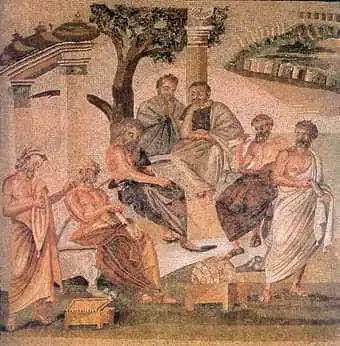 Roman mosaic of the Academy.
SeniorityThe Academy had been in operation for a few years longer than Aristotle had lived, so the majority of the pupils were his seniors with a considerable margin. He would have had a hard time, especially in the first couple of years, when still a teen, to gain their respect. Speusippus, son of Plato's sister and the one to head the school at Plato's demise, was 23 years older than Aristotle. Xenocrates, who was to accompany him on the departure from the school at the death of Plato, was 12 years his senior.The Greeks were quite conscious of age and put a great significance to it. Certainly, Plato supported this view. To be a senior in his school must have meant plenty, and to be as much a junior as Aristotle was when arriving a teenager, must have had the very opposite significance. Unless he was a pinnacle of wisdom already at his arrival, neither the pupils nor the leader of the Academy would have thought much of him, or allowed him to make a mark. Dionysius of Halicarnassus says that Aristotle was "recommended to Plato as a student", unfortunately without implying by whom. If Aristotle arrived with a recommendation from someone of dignity, he could have assumed a significant position at the Academy already from the start, but there is no other indication of this. It is also hard to imagine what person in Aristotle's surroundings at Stagira, would have made a recommendation to impress Plato, a dignified nobleman of Athens. Plato was far from the only one teaching at the Academy, and it is generally assumed that the intellectual atmosphere was open, allowing each his own view and a freedom to express it. Still, Plato was the unquestionable center, the mind attracting the others like a magnet, and when he spoke they all listened. Having started his school at the age of his flourishing, Plato was also significantly older than his pupils, which added to his authority and dominant position. In such a group, with one clear center of attention for all, the students were sure to compete in one way or other for his favor. The senior students would force the newcomer to remain in the periphery for years. Not only was Aristotle a newcomer and a teenager, he was also a stranger from a distant town of little significance to the entourage of Plato. Moreover, he had in his background some connections to Macedonia, a country toward which the Athenians had ambiguous feelings indeed. Later on in his life, Aristotle would on more than one occasion experience the hostility of Athenians toward anything and anyone Macedonian. In the literature on Aristotle, and the sources, it is often stated that he was quickly enclosed into the inner group at the Academy, fast to receive Plato's care and respect, quick to be one of the prominent teachers, and soon to produce writings of quality and broad interest. I doubt it. It is far more plausible that Aristotle was kept aside in the Academy for years. He may even have been regarded as somewhat peripheral during most of his two decades in it. For Plato to have embraced Aristotle quickly, it would have been as a lover, and we have no indication of that. Some facts hint that his position in the Academy was indeed of modest magnitude. Aristotle himself, in that of his writing remaining, mentions nothing of his attending the Academy, and rarely speaks of Plato in other ways than as the originator of theories he is about to oppose. When Aristotle does so, it is with few exceptions by reference to Plato's written dialogues. There is a much quoted praise of Plato, which Aristotle is said to have expressed. According to Olympiodorus, Aristotle called Plato "one whom it were not right for the bad even to praise, one who was the first if not the only man to show forth plainly by his own life and methods of discourse how we may become both good and happy, and without whom no man can ever receive this blessing." If indeed these are Aristotle's words, they seem a bit out-of-character, more what a devoted disciple of a prophet would say, than a philosopher committed to rational order. In a situation of just having received news of Plato's death, it would have been understandable, and should be read with that in mind. Otherwise, the expression holds such swollen proportions, it comes near to irony especially from a man who allowed himself to dispute his teacher's theses. Diogenes Laertius quotes Aristotle as saying about Plato's dialogues that their style is "half-way between poetry and prose." Whether this is praise or not is hard to decide, but Aristotle points out an esthetic quality, instead of a rhetoric one. It differs distinctly from what writing remains of Aristotle, which is factual and in no way near poetry. But among the lost works of his, there are several dialogues, praised in their time for an eloquence, which may have been quite similar to that of Plato's. Anyway, if Aristotle moved away from that style of writing, as he did from Plato's ideas, he might have seen them linked in such a way that for proper science, such language was not adequate. Diogenes Laertius also mentions, having it from Favorinus, that when Plato was reading his dialogue On the Soul, of all his pupils only Aristotle stayed to the end. Certainly an indication of perseverance, but a proof of devotion it is not. Aristotle was also to explore the subject in texts of his, the one remaining belonging to his esoteric works. The subject obviously intrigued him. In the Nicomachean Ethics Aristotle says that those who developed the theory of Forms are friends of his, but continues to reject the theory, as it would be "obligatory, especially for a philosopher, to sacrifice even one's closest personal ties in defense of the truth. Both are dear to us, yet 'tis our duty to prefer the truth." This theory is fundamental in Plato's world view, as well as in Aristotle's criticism, wherefore it is odd that Aristotle refers it to a collective instead of to that one man. Had it not been generally known who was credited with it, Aristotle might have been this discreet to avoid discrediting his old teacher. Considering the vast spread of Plato's writings, it seems more likely that Aristotle wanted to imply the theory as a work of more minds than Plato's. Aristotle may have seen the Academy as a melting pot of ideas, forming the Platonic theories as a collective and not individual process. He may also have been pointing out that he was pretty much the sole individual in doubt of the theory, or maybe even in doubt as to the wisdom of what the Academy produced in general. If Aristotle made an impression on Plato, he would have been mentioned in Plato's dialogues were they not always set to the time of Socrates. With that setting, none of Plato's pupils could be included. In his letters, where far from all of the 13 remaining are regarded as authentic, Aristotle is not mentioned but there is in them no particular reason why he should be. There is no way to use Plato's own texts to decide on the role or even presence of Aristotle in the Academy. Still, it is quite clear that Aristotle did not have a position at the Academy as significant as that of Speusippus, and some others. We must conclude that Aristotle was not regarded as a major character at the Academy, nor in Plato's mind. We may want it differently, but there it is. What is yet to be examined is whether any of the other pupils of Plato mention Aristotle in their writing, but the fragments of their texts are so sparse, they are of little use for such an investigation. The fact that Aristotle remained with the Academy until Plato's death is no evidence of a close relation between the two. Where else would he go? There, he had an environment, which was immensely stimulating to the intellect, and by time he must have become one of the teachers. Also, it was a comfortable way of staying in Athens, certain to hold all the attractions of a magnificent city. Aristotle would leave only when things got complicated, and still he returned sometime after that to leave again, when his life was at stake.
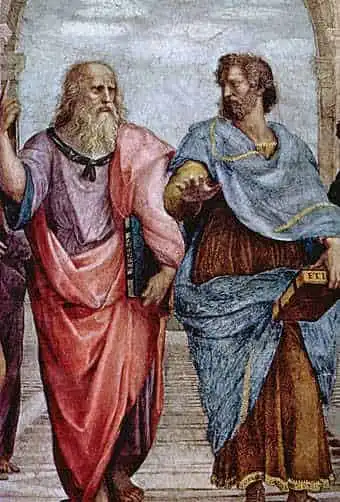 Plato and Aristotle. Detail from School of Athens, by Raphael.
Lectures at the AcademyRaphael's painting, as well as the dialogues by Plato, give an impression of teaching at the Academy as a continuous stroll in the park, where Plato's mouth spits jewels for the pupils to catch with their ears, respectfully returned by questions of theirs, in an atmosphere close to relaxed conversation. The reality of it was likely to be more orderly.There were lectures, like in a present day university, usually on fixed subjects, such as rhetoric or mathematics. When the senior pupils were teaching, they were probably bound to some kind of curriculum, while Plato might have allowed himself a more free choice and treatment of subjects at his lectures. Still, Plato's lectures, too, were focused on certain subjects or perspectives, just as his dialogues were, to some extent. In some Aristotelian fragments, one lecture-theme is specified: the good. Simplicius states that Aristotle in his work On the Good, which is lost to us, refers to Plato's lectures on the subject, and others present such as Speusippus, Xenocrates, Heraclides and Hestiaeus did the same, writing down Plato's views. The Academy was, no doubt, a kind of oasis for the contemplative mind. Plato expressed some concern as to the possible consequence of this, in his Letter 6 to Hermias. What his students lack, he says, is the ability to guard themselves from evil and unjust people, since they have no experience of such. They have lived the most part of their lives "together with us, who are just and not evil men". Though the authenticity of that letter is questioned, it probably represents Plato's view on the matter fairly. The Academy was by its members regarded as a sort of haven for intellectuals, for men of noble minds and souls. They may even have been a bit pompous about it, since contemporary comic poets sometimes ridiculed Plato and his followers.
Diogenes Laertius gives a few examples, such as from Hedychares by Theopompus: "There is not anything that is truly one, even the number two is scarcely one, according to Plato." And Timon made a pun on his name: "As Plato placed strange platitudes." Amphis in Amphicrates: "I know no more about it, master, than I do of the good of Plato." In Meineke's Dexidemides: "O Plato, all you know is how to frown with eyebrows lifted high like any snail." The joy of reasonFrom both Plato's and Aristotle's works, one common factor stands out the very joy of reasoning, of using the intellectual process to sort out any kind of subject, and reach conclusions.Plato in his Socratic dialogues takes such delight in the discussions, where his teacher's rhetoric repeatedly leaves everyone else far behind. It's almost like a game, with boys impressing each other by word play. In this game Socrates through Plato decides the rules, and still, it's not rare that he practically gloats at winning. Not that the subjects discussed and the conclusions reached aren't frequently quite impressive and thought provoking, but that ritual, that repeated lustful form of it, hints on a delight not at the results, but at the playful way they are reached. Plato, and quite likely his readers, too, enjoy the skilled performance of rhetoric. It's almost a show, in which the central player shines, and that overshadows even the outcome of each discussion. We are left with one outstanding impression once again, our hero has bested everyone else, and proven himself the champion. Rhetoric was indeed a skill praised more than any knowledge or scientific accomplishment, at that time. In the competing school of Isocrates, that was being taught with little care about mathematics, the natural sciences, or any other learning. A noble Greek should be able to speak convincingly, whatever he knew about the subject at hand, and the best ones won competitions bringing considerable prices. A brilliant speaker could get wealthy indeed, and praised, and have several statues erected in his honor. That did not happen much to mathematicians or astronomers, or even those who taught their students to differ between good and bad. Plato's Academy dealt much more with the sciences than did the school of Isocrates, and never reached the same praise of eloquence as his competitor did. But in the Socratic dialogues, his rhetoric was always superior, and the readers of them would see it in no other way. Since written texts were mostly read out loud, and rarely studied by silent readers in solitude, they became enactments where Socrates, Plato's voice, never lost an argument, never expressed a flawed or unrooted thought. Aristotle's rhetoric is quite different from Plato's, at least in the remaining work of his. Still, the joy of reason is just as evident. When Aristotle studies a subject, he dissects it, looks at it from every possible angle, and carries his arguments forward, step by step, obviously pleased with his ability to analyze and conclude. Aristotle is having fun, when presenting theories of old, putting them to a test of reason and deeming them fail, then reconstructing them with a more solid, sometimes quite basic chain of arguments. Aristotle's method is fool-proof, but also limited. What would not comply to his cosmology of absolute logic, would not be included. What Aristotle concludes does little more than repeat what he has started off by defining. It is all quite tautological, a sorting out the complexity of reality, until it is divided into very simple fragments. Those he arranges in a strict and easily understood structure. Is that structure real, does it represent reality with fidelity? Maybe, and maybe not. But it's fun. The human intellect exercises, and this being not a dialogue but a monologue, how could it go wrong? The speaker will prove to be right, end of discussion. Again a game, not free of boyish pride. This joy of reason expressed in the works of Plato and Aristotle must have been their primary motivation, as well as the filter through which all that they contemplated was being sorted. The Academy must have been practically intoxicated with it. Men strolling around, calling each other wise, never getting tired of proving it. A pleasant pastime for people who didn't have to work for a living.
Of course, these schools were also the melting pots, where knowledge of the world emerged, in due time. But we would be using a viewpoint quite out of place, if we were to think that the drive of the schools was to further human knowledge. Ability, perhaps, but not necessarily knowledge. The satisfaction, as in the rhetoric school of Isocrates, was to seem and sound wise. There was not, anyway, that much need for scientific knowledge as we see it. The stars were very far away, whatever powers and laws moved them. The ideal for man and his society was way out of reach, no matter how obvious the way to it might have seemed. There was not very much for a man of knowledge to do, but talk about it and try to have fun while doing that. NEXT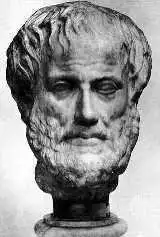
AristotleIntroductionAristotle's LifeTimelineAristotle's PoeticsAristotle's Cosmology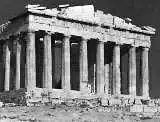
The Greek PhilosophersAbout CookiesMy Other WebsitesCREATION MYTHSMyths in general and myths of creation in particular.
TAOISMThe wisdom of Taoism and the Tao Te Ching, its ancient source.
LIFE ENERGYAn encyclopedia of life energy concepts around the world.
QI ENERGY EXERCISESQi (also spelled chi or ki) explained, with exercises to increase it.
I CHINGThe ancient Chinese system of divination and free online reading.
TAROTTarot card meanings in divination and a free online spread.
ASTROLOGYThe complete horoscope chart and how to read it.
MY AMAZON PAGE
MY YOUTUBE AIKIDO
MY YOUTUBE ART
MY FACEBOOK
MY INSTAGRAM
STENUDD PÅ SVENSKA
|
 Cosmos of the Ancients
Cosmos of the Ancients